At the 38th anniversary of the passing one of the founding fathers of this nation and the Second Prime Minister Tun Hj. Abdul Razak Husssein, his two most prominent sons remembered their father.
Remembering my father, Tun Razak
BY NAZIR RAZAK
JANUARY 14, 2014Thirty-eight years ago today, on January 14, 1976, Tun Abdul Razak Hussein passed away in London from complications wreaked by leukaemia.
Malaysia lost its prime minister. I lost my father. Malaysia was 19. I was nine.
The days immediately after were shrouded in personal sorrow and national mourning.
My four brothers and I sought to comfort our mother, while the public and heartfelt outpouring of grief throughout the country served as a resounding reminder that we were not alone in our time of tragedy.
I must confess that given my age and my father’s hectic schedule, I sometimes lament the fact that he gave so much to the country, leaving too little for his family.
However, I have never wavered from being enormously proud of his selfless dedication to our young nation.
i
Together, on his last Hari Raya. – Pic courtesy of Datuk Seri Mohd Nazir Razak, January 14, 2014.
I did not get the time to know him. But imprinted in me are the values he imparted, the integrity that he insisted upon, above all. Yes, above all, including his family.
I recall the time when my brothers and I approached him one evening and asked that a swimming pool be built at Seri Taman, the prime minister’s residence where we lived.
The lawyer that he was, he insisted that we make our case with logical and rational arguments. We did so, and thought we had presented the argument pretty well, until we noticed his face had started to darken, and the eyes flashed with annoyance.
My father made it abundantly clear that while Seri Taman may be our home, the house belonged to the government and, hence, to the people.
Anything spent on it would have to come from public funds, and there was no way he was going to allow the state coffers to be depleted on something as frivolous as a swimming pool.
“What will the people think?” he thundered.
In my years of growing up, I actively sought to hear from people who knew my father well, including those who had worked with him in government, politics, the Merdeka movement and so on as well as his personal friends.
It was my only way of getting to know him. What stood out for me was that in almost every conversation I had about him, the qualities they always referenced were his values.
As the custodian of the nation’s coffers, his frugality was legendary.
“You had to account for every cent, or he would be on your back,” one former minister told me.
Well, I knew that already. Not just from the swimming pool episode, but many anecdotes.
My elder brothers often talk about one of the rare opportunities they had to accompany him on an official trip to Switzerland.
He made sure he paid their expenses himself, he was so careful with the cost of the trip to the government that he moved his whole entourage to a cheaper hotel than originally booked, and they dined over and over again at the cheapest restaurant in the vicinity of the hotel.
And then there was his final trip to Europe in October 1975 for medical treatment. He must have known that it could well be his last trip, yet he did not allow my mother to accompany him to save his own money; probably concerned about her financial situation after his passing.
She only managed to join him weeks later on the insistence of the cabinet and with a specially approved government budget for her travel.
His integrity was another trait that came up often in conversations. He was guided by what now seems a somewhat quaint and old-fashioned concept of public service; that a public servant is first and foremost a servant of the people whose trust must never be betrayed.
The other point that kept being repeated was his stamina.
Many were later astonished to learn he had been suffering from leukaemia, given that when in office, he was constantly on the move, attending to official duties, immersing himself in the minutiae of policy and, of course, his famous surprise visits to constituencies around the country that allowed him to hear directly from the people about what was happening on the ground.
Of course, few people forget to recount Tun Razak’s dedication to rural development. He was “People First”, long before the sound bite.
But above all, what they unanimously emphasised was Tun Razak’s commitment to national unity – towards building a nation where every single one of its citizens could find a place under the Malaysian sun.
That vision was encapsulated in the two initiatives that my father spearheaded in the wake of the May 13, 1969 tragedy – the formulation of the Rukunegara in 1970 and the New Economic Policy in 1971.
The Rukunegara reconciled indigenous cultural traditions and heritage with the demands of a modern, secular state.
The NEP’s goal, as outlined in the policy announcement, was the promotion of national unity to be undertaken via a massive experiment in socio-economic engineering through the twin thrusts of eradication of poverty irrespective of race and economic restructuring to eliminate identification of economic function with ethnicity.
The debate on the NEP rages on today. I myself have publicly remarked that something has gone awry in its implementation.
The fixation on quotas and the seemingly easy route to unimaginable wealth for a select few have created an intra-ethnic divide in class and status, while fuelling inter-ethnic tensions. Both these developments serve to undermine, if not completely negate, the overarching goal of Tun Razak’s NEP, strengthening national unity.
What went wrong? Some have argued that the fault was affirmative action itself. For me, it was because its implementation was skewed by the focus on the tactical approach rather than the commitment to the strategic goal.
The NEP has certainly helped eradicate poverty and reduced economic imbalances by spawning a Malay middle class.
However, in terms of the larger vision, the best that can be said about the NEP is that it initially helped blunt the edges of racial conflict in the aftermath of May 13.
Thanks in part to the NEP, Malaysia did not follow Sri Lanka, which became embroiled in decades of strife between the immigrant Tamils and the indigenous Sinhalese.
That is no small achievement. But the NEP promise of strengthening national unity has not been realised.
In fact, there are signs that inter-ethnic and intra-ethnic tensions are once again approaching worrying levels.
What can be done? There is a Malay proverb: “Sesat di Hujung Jalan, Balik ke-Pangkal Jalan.” Loosely translated, it means “When one has lost one’s way, one should return to the beginning.”
And “the beginning” here, in my view, is the values, commitment, vision and inclusiveness demonstrated and embodied by Tun Razak.
I have mentioned earlier the remarks about his integrity, commitment to the concept of public service and his vision of a progressive, prosperous and united Malaysia. But let me close here by emphasising two other highlights of his legacy.
One, he was a true democrat. Two years after running the country as head of the National Operations Council, he disbanded the committee and restored democratic rule.
He held virtually dictatorial power as the NOC chief, but his worldview and values rested on a foundation of democratic rule, not dictatorship. His decision-making style exemplified this as well: he brought in all who needed to be involved and engaged in a consultative discussion before any major decision was adopted.
He never excluded those with contrarian views, he encouraged multiplicity of opinions in order to have the best chance of making a right final decision.
Two, while he was committed to helping improve the material quality of life for the majority Bumiputeras to avert another “May 13”, he viewed this as a national prerogative rather than a racial one. That, to me, explains his determination to involve Malaysia’s best and brightest in this quest, regardless of their racial or ethnic origin.
Just check out those who served him and his administration back then. They were and are, Malaysians all, united in their determination to rebuild this nation from the ashes of May 13.
That was Tun Razak’s legacy to Malaysia. We can best honour it by returning to “Pangkal Jalan”. – January 14, 2014.
* Datuk Seri Mohd Nazir Razak is the son of the second prime minister, Tun Abdul Razak, and a brother of Prime Minister Datuk Seri Najib Razak. He is managing director and chief executive of the CIMB group.
****************
Prime Minister dato’ Sri Mohd. Najib Tun Razak vowed to continue the Bumiputera agenda, like his father:
NST story:
14 January 2014| last updated at 10:31PMPM: Tun Razak’s legacy must continue
By HANA NAZ HARUN | news@nst.com.my
0 0 Google +0 0 0 commentsKUALA LUMPUR: The late Tun Abdul Razak Hussein has left a legacy that must be continued, said Prime Minister Datuk Seri Najib Razak.
Najib said his father, the second prime minister of Malaysia, who died on Jan 14, 1976, in London, due to leukemia at the age of 53, had drawn up policies that had improved the livelihood of the Malays and the Bumiputeras.
“It is our commitment to fight for the unity of the Malays. With the fighting spirit of Tun (Razak), we will continue this struggle until his aims and aspirations are achieved,” Najib said after joining a congregation in the reading of Yaasin and tahlil for the late Razak at the Ar-Rahah Mosque in Kampung Kerinchi.
Najib and his wife, Datin Seri Rosmah Mansor, arrived at the mosque at 7.10pm.
The mosque was completed in 2012, a gift from Najib’s brother, CIMB Group chief executive Datuk Seri Nazir to their mother, Tun Rahah Mohamad Noah.
Among those present at the tahlil were Rahah, Nazir, Malacca Yang di-Pertua Tun Mohd Khalil Yaakob, Minister in the Prime Minister’s Department Datuk Seri Jamil Khir Baharom, Felda chairman Tan Sri Isa Samad and former Federal Territories and Urban Wellbeing Minister, Datuk Raja Nong Chik Zainal Abidin.
Prime Minister Datuk Seri Najib Razak attends tahlil prayers for his father, Tun Abdul Razak Hussein at the Ar-Rahah Mosque in Kampung Kerinchi. Present also are Malacca Yang di-Pertua Tun Mohd Khalil Yaakob (2nd from left) and Felda chairman Tan Sri Isa Samad (2nd from right)
Read more: PM: Tun Razak’s legacy must continue – Latest – New Straits Timeshttp://www.nst.com.my/latest/pm-tun-razak-s-legacy-must-continue-1.462445#ixzz2qNzyxJ1e
*************
They may present themselves with the values and upholding the legacy of their father, who as a leader demonstrated unequivocally was an extraordinary selfless man. However, it reality they are actually not.
First of all, Tun Razak really cared and gave a lot of thought to develop downtrodden Malaysians especially the Malays. Even in the infancy of this nation, then the Deputy Prime Minister paid so much attention on national and rural development.

Tun Razak as the Minister in charge of Rural Development, speaking to settlers at one of the FELDA schemes
He was instrumental in the formation of Federal Land Development Authority (FELDA), a Federal Government agency incorporated to acquire and exercise land reformation programs for the purpose to develop land schemes. It took the form of communal estates which enabled a of landless farmers to work on and eventually own part of it.
Prime Minister Najib and Nazir took the businesses developed from FELDA and listed it.
The listing of FELDA Global Ventures (FGV) Holdings Bhd. did provide some direct benefits to the 112,635 FELDA settlers nationwide. However, it was CIMB which benefitted immensely in various fees from the IPO as the banker and lead arranging institution for the listing exercise.

Prime Minister Najib and FGV CEO Emir Mavani
Then Prime Minister Najib endorsed Non Malay executives to be brought in and strategically placed within FGV and eventually be promoted as the Group CEO. Recently, three key positions at Executive Vice President level are being filled by Non Malay professionals.
CIMB was originally incorporated as Bank Bumiputera Bhd., as result of the first Bumiputra Economic Congress in 1965. The congregation of Malay minds in Kuala Lumpur was held to discuss and formulate plans for the Bumiputra Economic Agenda masterplan, organised and sponsored Ministry of Rural Development where Tun Razak then the Minister.
Then Deputy Prime Minister Tun Razak brought in his personal friends and confidante to lead the bank created to help Malay business community and indirectly the Malay Agenda.
Today after various series of transformation, CIMB is no longer a “Bumiputera Bank”. Almost all key positions (with the exeception of Nazir’s post, the Group CEO) are filled by Non Malay professionals. Nazir is unlike his father, who would provide opportunities for Malay professionals to bloom, the most meteoric-risen banker gave emphasis on making money the prominence.
The elder brother too, brought changes into Petronas when he came into power. Despite that Petronas did very well where top and key positions were held by Malay professionals, Prime Minister Najib believed that the ‘necessary transformation’ of Malaysia’s only corporation listed under the super exclusive New Seven Sisters club should include Non Malay professionals.
As such, 50% of the Executive Vice President and 40% of the BoD posts were restructured and Non Malays were brought in.
It was Tun Razak’s vision and leadership which brought the nation to come together and the New Economic Policy (NEP) formulated, planned and rolled out. The affirmative action policy which is designed to alleviate the socio-economic stature of downtrodden Malaysians, targetted to most to the various Bumiputra communities who dwell in the rural and under developed areas.
On the contrary, Nazir Razak ‘bastardised’ NEP. He did receive a leg up as he started as a broker in the investment banking instead of being a banker doing traditional banking work. That enabled the opportunity to demonstrate his mettle. Nazir tweaked CIMB from a high street bank into a fee-based commercial bank.
Sime Darby, Guthrie and Golden Plantations (formerly known as Harrison Crossfield) are some of the British PLCs in Malaysia that were nationalised via series of ‘dawn raids’, as an extension to the NEP to allow assets and wealth in the form of plantations businesses that made this country great owned by Malaysians, especially the Malays. In 2007, Nazir came up with the bold blue print to merge the three corporations as one.
Hence CIMB formed Synergy Drive Sdn. Bhd., to execute the corporate exercise which saw RM47 billion of assets were transferred and restructured under one group. That earned Nazir and his stream of bankers a cool RM300 million in consulting fees. Nazir lead the process of ‘revolutionising’ Malaysian banking scene to be centered on fee-based activities and commercial papers hawking instead of traditional banking, as a catalyst for productivity and growth.
Prime Minister Najib’s wish for Khazanah Nasional Bhd. as the investment arm of the Federal Government to focus and develop on ROI and adding value in expanding market capitalisation, instead of physical productivity and traditional growth as catalyst for the economy.
Prime Minister Najib’s ‘Transformation’ plans and policies as his bet to be the driving force to build the momentum and expand the economic growth, which is centred with the capital and financial markets as the porpulsion for the engine of growth. On the extreme end, Tun Razak focused on economic activities across the board and emphasised more on industrialsation as the driving force.
The recent Bumiputera Economic Empowerment Program announced by Prime Minister Najib on 14 September 2013 is superficially beneficial for the Bumiputra, especially the Malays which is more than 75% of the Bumiputera populous. Strategically, it most likely would not bring about the desired results and meet the objectives as per laid out.
Khazanah where Prime Minister Najib sits as the Chairman of the BoD has never been seen as having a ‘Bumiputra Agenda’. He had to tweak on the current chartered path of Temasek-wannabe in his announcement of BEEP in UiTM to require KPI on BCIC growth for all GLC CEOs.
Tun Razak formed Malaysia Airlines system in October 1972 which played the primary role for communication and logistics as the national carrier. 39 years later, his two sons almost killed and buried the national pride.
The more recent development about Prime Minister Najib’s leadership is the cost of running the government under his stewardship. He has been seen as extravagant and opulence. Especially on expenditures for his own convenience, comfort and luxury.
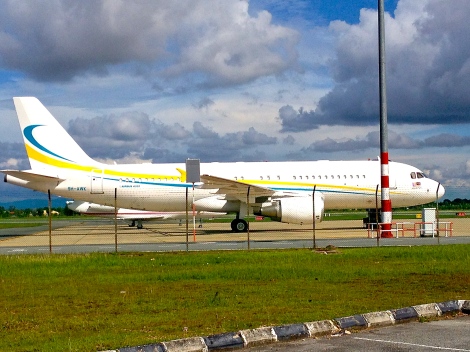
The 9M-AWK, shot in Lapangan Terbang Sultan Abdul Halim, Alor Setar the morning a VVIP party leader flew in to attend the breakfast with rakyat of Pendang. This is something Tun Razak would not stomach
Like in Nazir’s own story, this is something that Tun Razak would not stomach.
The intresting bit about Nazir’s own penned piece, is about Tun Razak left for London with Dr Pherson on his last treatment for the terminal leukemia. Tun Rahah Mohamed Noah did not accompany him because he wanted to save cost and not make it a burden to the Malaysian Government.
That is so unlike Prime Minister Najib, where his wife Datin Sri Rosmah Mansor several times travelled using the Malaysian Government facilities and expenditure such as the ACJ319 VVIP jet. The most recent was the Women International Entrepreneur Forum in Qatar. That trip is believed to cost the Malaysian Government more than RM1 million.
Tun Razak was once the Foreign Minister and Defence Minister at the same time. He demonstrated being a strategic leader with his diplomacy style and wit during the 1960s in a region turmoiled in superpowers wrestling for control and domination.

Tun Razak was one of the founding fathers of ASEAN
When he assumed the premiership in 1970, he brought Malaysia away from being an ally of the West in the region into a neutrality. He mooted the idea of South East Asia being a Zone of Peace, Freedom and Neutrality (ZOPFAN) where the Kuala Lumpur Declaration was made in 1971. In the same stroke fortified ASEAN where he was one of the founding fathers, to remain a bloc of economic and cultural co-operation between neighbours.
On the other hand, he gave a lot of emphasis for the nation’s sovereignity and realm without compromising on defense and security.
The Armed Forces saw significant growth in man power, assets and capability under Tun Razak’s watch. So did the Police. Example was the formation of VAT 69 Police Commando unit modeled after the British SAS, where combatting the communist terrorists in the deep jungle and border have started to be a precision interjection operation.

Prime Minister Najib Razak, President Barack Obama and wives at the APEC Summit in Hawaii
It is common knowledge that Prime Minister Najib has been trying to be chummies to Western leaders such as US President Barack H. Obama and British Prime Minister David Cameron. Many observers see this as him trying too hard for Malaysia to be really close to the United States. Upon assuming the sixth premiership, he even despatched a confidante to Washington D.C. as the Malaysian envoy with ministerial status.
As part of his ‘political transformation plan’, to the shock of the nation Prime Minister Najib unprecedentedly announced for the abolishment of the Internal Security Act (ISA) and Emergency Ordinance (EO) on 15 September 2011. Later, this proven to very counter productive both from the national and internal security stand point as well as politically.
Politically, Tun Razak gained respect and admiration of the Chinese at the juncture where they heart of the nation almost burned down due to racism, radicalism and extremism. Prime Minister Najib in his effort to woo the Chinese with his over-bearing ‘generousity’ received the exact opposite. Majority of the Chinese gave him the ‘Chinese Tsunami’ instead.
In many ways maybe these two Tun Razak’s boys would want to believe that they have inherited their father’s personal legacy, which brought tremendous transformation in so little time and space. In reality, they are closer of being contradiction to their famous and legend as their father.
*Updated Wednesday 15 January 2014 1000hrs
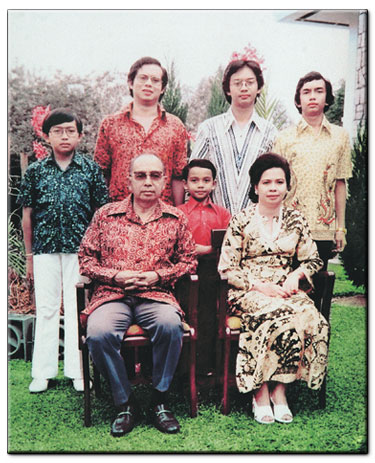
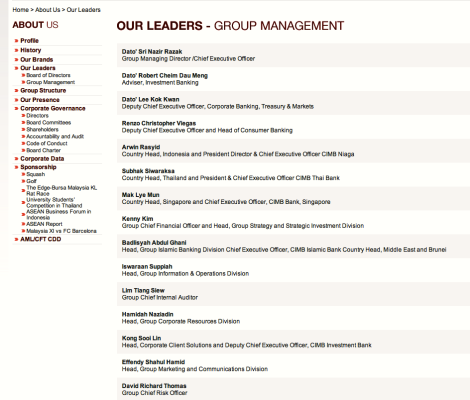
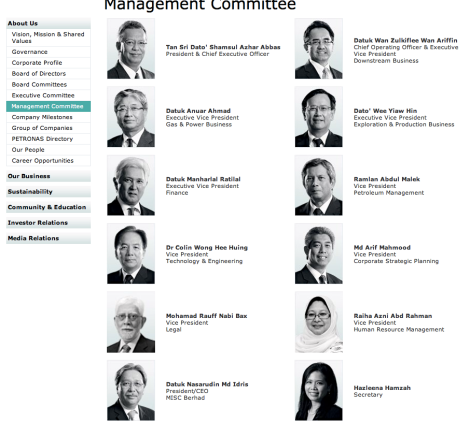
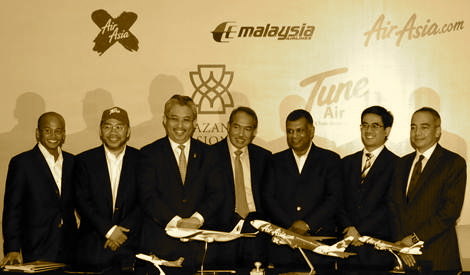







Bro,
Nazir wrote the article to Salvage whatever remains of the Family Name which has been ravaged by his elder brother. Sighhh
1. Memang kita impikan legasi Tun Razak. Paling tidak dalam konsep permodenan Malaysia melalui ICT dan infrastruktur, memperkasakan ekonomi bumiputera dari segi partisipasi penuh( tidak lagi tahap 30%) pemilikan harta bertambah nilai dan akhir nya merangkumi kesejahteraan rakyat jelata.
2.Sayang nya, visi dari legasi ini telah di nodai anak-anak liberal yang mencari keuntungan yang tidak memihak kepada rakyat. Air mata dan darah satria Melayu tidak lagi di hargai. Jika mereka sedar penderitaan moyang, ibu-bapa kita dulu zaman penjajah, zaman 13 Mei, sudah pasti kesinambungan legasi marak menyala. Ini lah akibat pendidikan yang di beri berasingan( ekslusif untuk anak-anak bangsawan /hartawan/Melayu atasan -stail British) menidakkan aliran kebangsaan.
3. Benar, sesat di hujung jalan balik semula akibat salah perhitungan. Gabungan Najib (+ Nazir) telah menggelapkan harapan Transformasi Melayu(NEP) sepenuh nya. Atau lebih jelas ‘mengabui’. Mereka menipu diri sendiri. Rakyat juga menerima padah. Terlalu mengharapkan kepada bukan melayu walhal
kepakaran Melayu(teras pendidikan dalam dan luar negara) di bakul sampahkan. Memang bangsa cina hebat berniaga TETAPI siapa yang memakmurkan mereka ? Bukan kah ‘melayu haprak'( majoriti rakyat) juga yang menyumbang ? Bukan kah juga polisi kerajaan yang mesra-peniaga ? Bukan kah TONGKAT ghaib juga berkuasa sehingga kini melahirkan jutawan-bilioner bukan bumiputera!
4. Satu perkara yang menyakitkan, keghairahan Kerajaan Negeri Selangor dan P. Pinang menyisihkan dan merampas institusi Melayu. Kenapa tidak di rembat sahaja UITM ? Giatmara dan lain berkepentingan sudah di mangsakan. Tidak PM Najib perasan ? Walaupun urusan negeri, tetapi apa yang cuba di rampas, hina sekali perbuatan nya ! Bukan kah semua nya sudah berpuluh tahun dan kenapa mesti di hancur leburkan tanpa dasar afirmatif yang di laungkan !
5. Jika hari ini tidak lebih baik dari semalam, maka kami mohon PM NAJIB bermuahasabah dan bermuzakarah dengan pakar-pakar Melayu. Mereka ramai di luar sana. Majlis Professor sudah berfungai tapi malang hanya di celah gigi. Para Ulamak bijak dalam ilmu nya tidak di manfaatkan. Para peniaga berjaya tidak di kerah beri sumbangan. Sesungguh nya menerjah kemajuan bukan perkara urusan adik beradik, isteri dan hubungan keluarga. Ia sesuatu yang mampu “DELIVER” dalam kerangka yang sudah di metrai.
Jika tidak, mohon PM Najib undur diri kerana gagal kerana percayakan sikap berdiam dan toleransi cara liberalisasi yang nampak mengundur semula ke 13 Mei 1969……
Infamous father? Or did you mean famous?
In retrospect, Najib seemed to have a pretty easy passage to political power. His rise at the early stage could be attributed to UMNO looking at him as a son of a Tun Razak and the name itself could draw sympathy and support without looking at the real leadership quality of the man. In other words he was catapulted into the core power in UMNO in such a short time. His entrenchment into political power via UMNO became deeper as years went by as he began building and getting loyal supporters among grassroots. At the same time he comes from a background so very different from that of his father. His father came from a not so well to do family and he worked his way out through education and acquired a sense of strong conviction to make lifes better for the rural people who were largely Malays which he fulfilled as a politician and a PM. His son had a far better socio economic life and probably knew or experience little about poverty and about struggle with poverty. Educated abroad and surrounded by the environment of the upper class his worldview was shaped differently. Hence the man was probably never subject to the rigorous tests of trials and tribulations. It may explain the disconnection with the people i.e he doesn’t seem to be able to identify with the grievances of the ordinary folks. His economic policies favour free market capitalism that would create greater income and wealth chasms between the rich, middle class and the poor. That seems to be his weakness apart from his inconfidence towards civil servants predominantly Malays and his knee jerk response on the NEP. So, yes his leadership is so different from that of his father like the distance between Earth and Pluto, maybe further.
P.S : Najib is largely style over substance with a worldview so locked up within the liberal oasis that he failed to recognise that the ideals of liberalism does not equal to the real chaotic and unequal world out there. He sees liberal mirage in the desert and begin to think he saw good new oasis with potentials to liberalise further – throw away ISA and EO, become overly friendly with free market capitalism, keep silent on divisive issues that need attention..and then lo and behold the liberal oasis that he thought he saw is nothing but miles and miles of barren desert. Should he continue to lead Malaysia ? Many people who have always supported UMNO, don’t think so.
I think most of the Malay just cant accept Najib Razak any more , forget about the legacy of the father , ‘bapa borek anak tak semestinya rintik’ .
He hurts the Malay more then defending them .
Dear Najib and Nazir
If not because of Tun Razak dedication during his time as DPM and later PM, by both of your current standard, you are nobody today.
Bro.
Dalam satu ucapan yang di buat oleh Nazir di hadapan pemimpin Cina MCA di Ibu Pejabat MCa dia mengatakan yang keluarga saya juga pendatang di Malaysia.Kami datang dari Makasar.Jadi kita sama sam pendatang di Malaysia.
Ucapannya di laporkan denga meluas oleh akhbar STAR dan akhbar Cina yang lain.
Ia tidak sedar,ini lah slogan yang di laungkan oleh Lee Kuan Yew,samasa Singapora dalam Malaysia.Di berkata orang Melayu bukan pendudok asal Malaysia,mereka juga pendatang.
Mungkin Nazir pada masa itu maseh kechil untok memahami apa yang di ucapkan oleh Lee kuan Yew.
Kedua,CIMB bank menjadi besar apabila mereka mengambil oleh semua asset BBMB.asalnya CIMB merukapan Bank Of Commerce dan asalnya bank yang kechil dari Serawak,Kwong Ming Bank.
Bank Bumi di asaskan oleh Tun Razak salepas Konvention ekonomi Bumiputra dan di tubohkan untok menyelamatkan peniaga Bumiputra,
Saya amat sedeh sekarang ini,CIMB sudah menjadi Bank yang sudah tidak mengambil indah nasib peniaga Bumiputra.
Tun Razak merupakan pemimpin yang betul betul berjiwa raayat,tapi anak anaknya yang semuanya dari kechil dihantar belajar di London dari kechil sudah tidak kenal siapa itu Bangsa Melayu.
Sedeh.
“…..The debate on the NEP rages on today. I myself have publicly remarked that something has gone awry in its implementation.
The fixation on quotas and the seemingly easy route to unimaginable wealth for a select few have created an intra-ethnic divide in class and status, while fuelling inter-ethnic tensions. Both these developments serve to undermine, if not completely negate, the overarching goal of Tun Razak’s NEP, strengthening national unity….”
Nazir,
Does the “select few with unimaginable wealth” due to the “fixation on quotas” include a certain son of a former PM who happen to have an easy passage en route to one of Malaysia biggest bank’s top job who is also one of Malaysia’s 40 richest man?
Something has gone awry indeed..
If your argument is about merit, then care to explain this:
“….At least CIMB is not the most disliked bank in Asia (it’s second, to Singapore’s OCBC, according to Bloomberg data). But that is little comfort to the ambitious Malaysian bank’s shareholders. It was the worst performing stock in Kuala Lumpur on Wednesday after a $1.1bn capital raising. The fact that the stock slipped just 3 per cent to 7.1 ringgit – the discounted price of the new shares – suggests investors have grudgingly accepted the cash call. But the fact remains that fewer than a third of analysts rate it a buy. Becoming more popular will be hard….”
– http://www.ft.com/cms/s/3/0eec1540-7d07-11e3-81dd-00144feabdc0.html#ixzz2qTstRhUb
Machiavelli asked in “The Prince” whether it is better for a ruler to be feared or loved. Mahathir certainly was feared. Badawi was loved but not feared. And now it seems that Najib is neither feared nor loved.
I have restrained myself from commenting – not wanting my emotions going out of control when reading what Najib and Nazir did and didn’t do for the Malays, and for the pendatang.
They should be shoved the books, published by the Historical Society of Malaysia, “The Malay Civilization” and “Tamadun Alam Melayu to know that bapak dan nenek moyang dia orang ada lah Melayu bukan sahaja dari definiasi Mlayu di Perlembagaan, tapi juga dari hal bahawa semua yang berasal di Gugusan Pulau Pulau Melayu ini ada lah Melayu mengiukut definasi kali manusia, tidak ada isu orang Bugis itu pendatang di Malaysia.
Tapi kalau mereka tak mahu menganggap diri mereka sebagai Melayu saperti kita semua, tak mengapa, tapi mereka mesti letak jawatan PM, dan CEO CIMB yang mulanya ada lah BBMB, di tubuh oleh bapak dia orang, Tun Razak, untuk membantu Melayu dalam perniagaan.
Sudah mula emosi saya keluar, perlu stop di sini, kalau tidak kata kata kusut akan timbul di mukasurat ini.
Agree with the opinion that Najib and Nazir would be nobodies if not for Tun Razak’s name.
They have things laid out for them on a silver platter. What they did or didn’t do for the Malays and instead pandering to the non-Malays are our fault – the UMNO Mmmalays especially. We let them continue where they are.
We should be making very effort to get them out. Rosak bangsa Melayu di buat mereka.
The two boys Najib and Nazir – Tanda Putera Not.
The time has come for all public officials in all Third World Countries to declare their wealth before they took office and now.